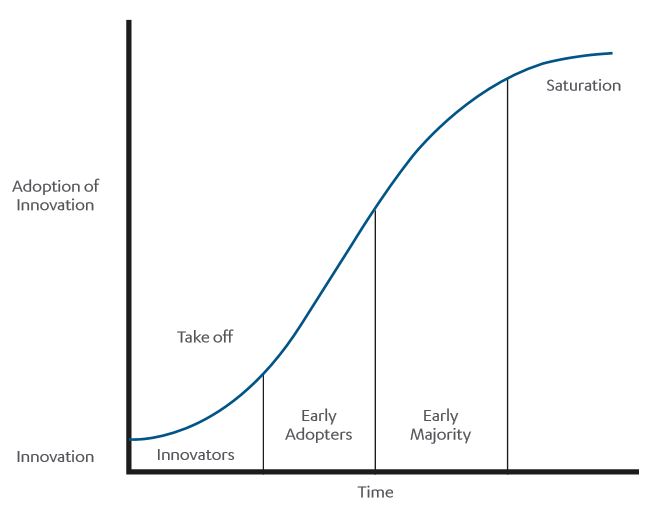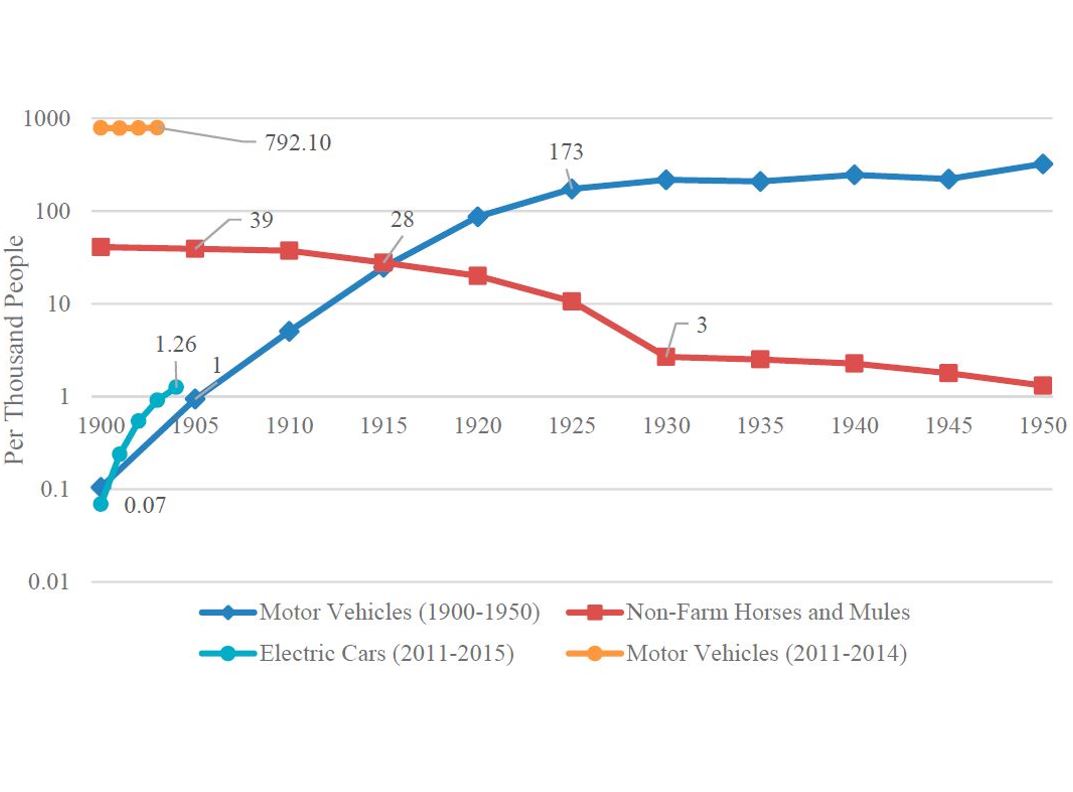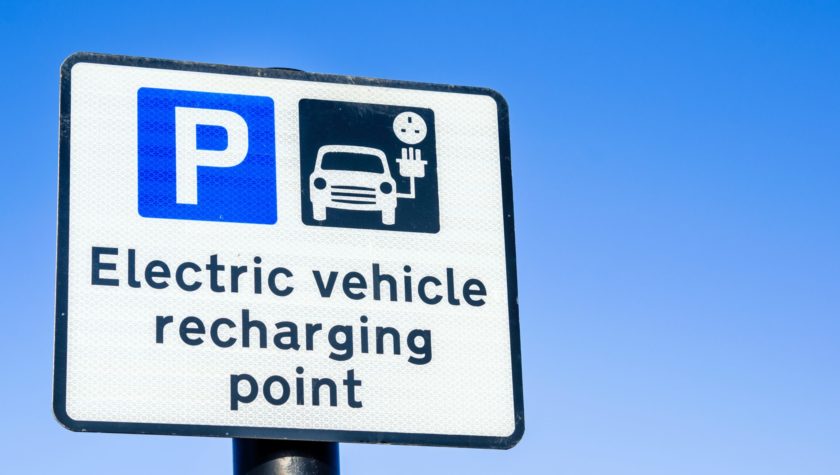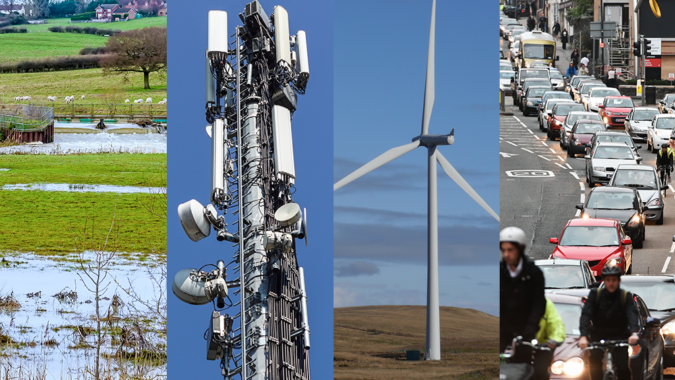Electric vehicles will play a major part in our future lives. And so, as part of its work on the forthcoming National Infrastructure Assessment, the Commission is looking at how and when a national network of charging points for electric vehicles could be delivered. One of the big questions that poses is how quickly electric vehicles will become the norm.
As you might expect, there are a lot of different estimates for the rate of electric vehicle uptake. Bloomberg estimates that at least 8% of all vehicles sold worldwide will be electric by 2025, while UBS predicts double that. In the UK, whilst the government is aiming for electric vehicles to account for 100% of all new car and van sales by 2040, current trends mean that by 2020 only 3-7% of new car sales are expected to be ultra-low emission.
There is a wide range of literature on the rate of adoption of new technologies. Most new technologies follow a similar S-shaped uptake curve. We can see from the graph below that technologies are initially taken up slowly, and then diffuse rapidly, with uptake only slowing down as saturation point is reached. However, the time a technology takes to reach saturation point varies widely.
.

A typical S-shaped curve of innovation diffusion
Everett Rogers’ book on the diffusion of innovations identified five attributes of any technology that affect its rate of adoption:
- the advantage it provides over the technology it is replacing
- its compatibility with existing practices
- how complex it is perceived to be
- the ability to trial the technology
- the visibility of results.
The take up of electric vehicles in the UK will also depend on pricing issues, and whether the current tax advantages enjoyed by electric vehicles remain in place. But, aside from the need for a charging network, electric vehicles perform well against Everett Rogers’ metrics. So, with a charging network in place, could electric vehicles be adopted more quickly than commonly predicted?
The IMF has published a working paper suggesting exactly that. Instead of basing its projections on the available data on electric vehicle adoption and battery cost reduction which is commonly used, it takes a historical perspective and considers two alternative approaches to this question.
The first approach uses the rate of decrease in horse ownership in the first half of the twentieth century to project the rate of decrease in conventional car ownership; assuming a one to one displacement of a conventional car by an electric one gives a growth rate for electric vehicles which matches their current uptake path. This approach predicts roughly 30% electric vehicle use by 2027 and more than 90% by 2042 in the US – well above the Bloomberg and UBS figures.
The second approach uses the growth rate of conventional cars in the US at the beginning of the 20th century to project the rise of electric vehicles from 2017. This approach predicts a much slower uptake – just 5% electric vehicle use by the late 2020s, and 36% by the early 2040s.

Motor vehicles vs. horses (USA)
The paper argues that the first approach is likely to be more accurate than the second. The uptake of electric vehicles is likely to be faster than that of conventional cars in the 1900s because:
- the potential market for electric vehicles is much larger than for motor vehicles in the past
- the pace of adoption may increase as prices converge to the average price of a conventional car (expected in the mid-2020s)
- electric vehicles are a closer substitute for conventional cars than cars were for horses
- environmental concerns are likely to encourage people to buy electric vehicles
- the ability to scale up the production of cars in the early stages of the automobile industry was far less than their capability now
- in the early 20th century, the lack of roads and petrol distribution network could have slowed down the adoption of motor vehicles.
Furthermore, the projections in the first approach are closer to the prediction of a standard technology diffusion model. The IMF paper therefore concludes the high uptake scenario of 30% electric vehicle use by 2027 and more than 90% by 2042 in the US is likely to be the most accurate.
Although the historic take up of cars was very different in the UK and the US, it is a reasonable assumption that the UK’s uptake of electric vehicles could match that of the US; both countries are developed markets and other recent technological changes have tended to have a similar rate of diffusion. In fact, a recent article in the FT forecasts that Europe will be quicker to embrace electric vehicles than North America.
Applying the IMF’s predictions to the UK would require this country to prepare for 30% of vehicles to be electric by 2027, and more than 90% by 2042. This is much higher than the Department for Transport forecasts on which policy in this area is currently being based, and so would require a significant acceleration in the rollout of charging points across the UK.
These are optimistic projections. But in my view, there may be a strong case for making sure the UK has the charging points are in place to support the fastest possible take up of electric vehicles (without adversely affecting the energy network). The UK’s greenhouse gas emissions targets will only be met if nearly all vehicles are electric by 2050. Global emissions are at a historic high, contributing to more extreme weather events, and rising numbers of climate refugees. And many UK cities are suffering illegal and harmful levels of nitrogen dioxide from car emissions, estimated to shorten the lives of 40,000 people a year. Acting sooner rather than later can only be a good thing.
Catherine Jones is a Senior Policy Adviser in the National Infrastructure Commission leading its work on electric vehicles.



